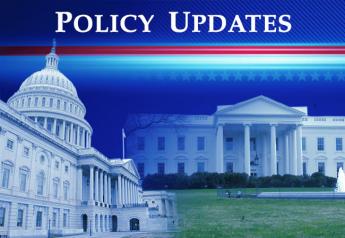China’s Second-Quarter Economic Growth Disappoints with Domestic & World Impacts

EPA still has not sent its ‘final WOTUS rule’ to OMB
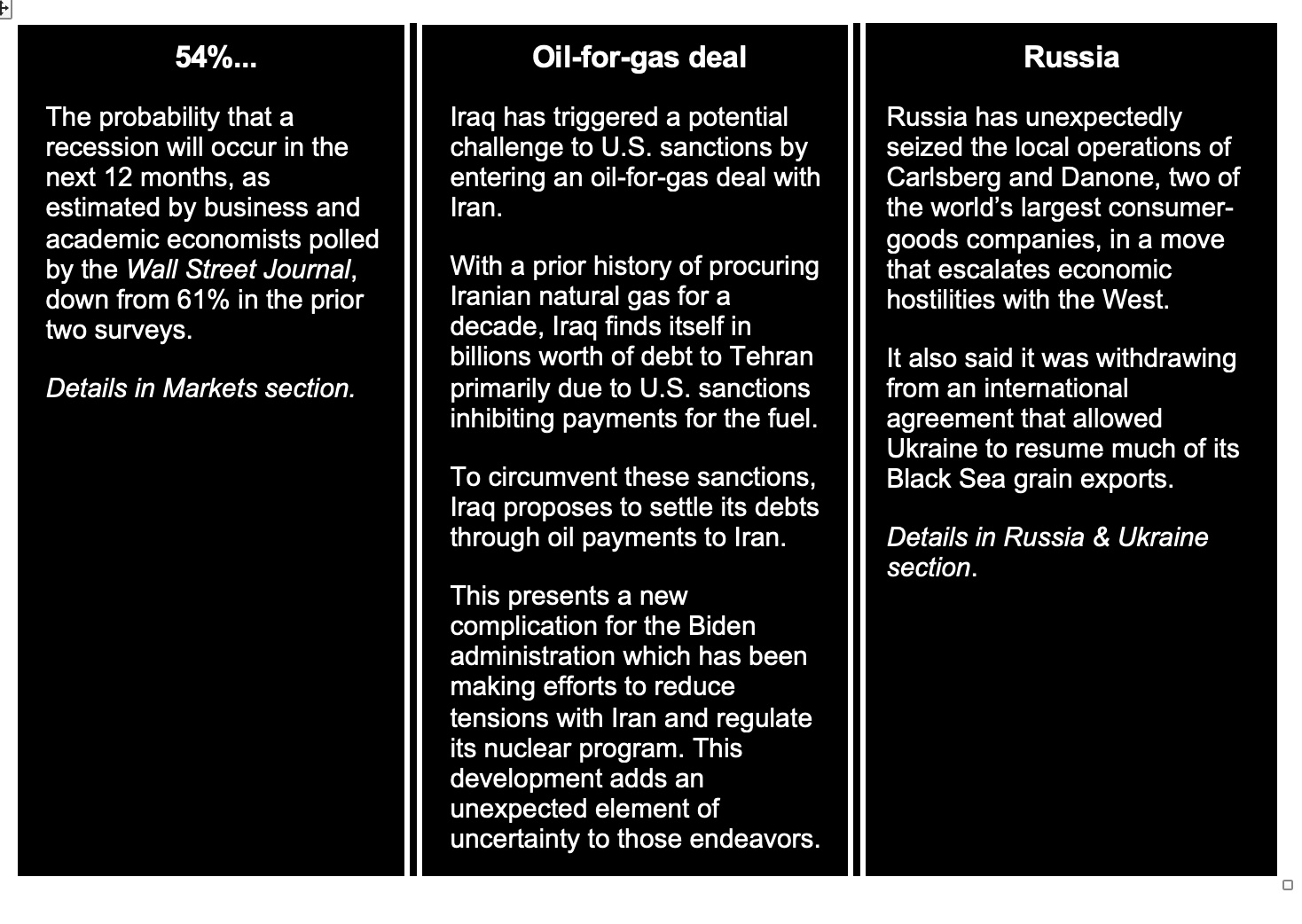
|
In Today’s Digital Newspaper |
China’s second-quarter economic growth disappointed, adding to worries about consumer spending and the property market and triggering more calls for stimulus. It also raises wider questions about global growth, the implications for international business and China’s dealings with the outside world. Details in China section.
Former Fed Vice Chairman Richard Clarida, now global economic advisor at PIMCO, said market bets on interest-rate cuts in March are understandable as he sees a U.S. “soft-ish landing.”
A presumed Ukrainian strike disabled the only road bridge connecting Russia with the occupied Crimean Peninsula, hitting once again a major symbol of President Vladimir Putin’s rule and constricting Russian supplies to its troops in southern Ukraine.
United Airlines reached a $10 billion accord with its pilots. The four-year agreement calls for pay raises for pilots of up to 40.2% over the duration of the contract.
U.S. dollar is stumbling, hitting its lowest value in over a year. Indications of subsiding inflation have led many to believe that the Federal Reserve could truncate its plan of hiking interest rates, ushering in a possible turning point for the global reserve currency. More in Markets section.
Head of the Teamsters' union, Sean O'Brien, urged President Biden not to interfere in their ongoing negotiation disputes with logistics giant UPS.
WOTUS update. EPA has requested court intervention in the Waters of the U.S. (WOTUS) issue as it prepares a new rule to replace its previous version. This follows a disruption caused by a U.S. Supreme Court decision earlier this summer. While EPA aims to present its new final rule for WOTUS before Sept. 1, the rule has not yet been submitted to the Office of Management and Budget (OMB) for review. OMB can take up to three months to review agency plans.
U.S. Trade Representative Katherine Tai will be focusing on trade issues with Kenya this week during her three-day visit, which includes a meeting with the country's president, William Ruto. More in Trade Policy section.
The transition to heavy-duty electric trucks is progressing faster than the requisite power grid upgrades required to support them, according to the Wall Street Journal. Details below.
In Massachusetts, the enforcement of a state law (Question 3) necessitating suitable living conditions for livestock has been delayed until Aug. 23. More in Livestock section.
New campaign-finance data show that Republican presidential contenders are drawing from a broad base of donors and could challenge President Biden’s fundraising prowess. More in Politics & Elections section.
|
MARKET FOCUS |
Equities today: Asian and European stock markets were mixed to weaker in overnight trading. U.S. Dow opened slightly lower, but then turned slightly higher. In Asia, Japan closed. Hong Kong closed. China -0.9%. India +0.8%. In Europe, at midday, London -0.2%. Paris -1.2%. Frankfurt -0.5%.
U.S. equities Friday: Only the Dow managed a higher finish on Friday, notching gains each session during the week. For the week, the Dow gained 2.3%, the Nasdaq rose 3.3%, and the S&P 500 moved up 2.3%. On Friday, the Dow was up 113.89 points, 0.33%, at 34,509.03. The Nasdaq declined 24.87 points, 0.18%, at 14,113.70. The S&P 500 was down 4.62 points, 0.10%, at 4,505.42.
An appeals court on Friday denied a last-ditch bid by the Federal Trade Commission to halt Microsoft’s planned $75 billion acquisition of videogame publisher Activision Blizzard.
Agriculture markets Friday:
- Corn: December corn rallied 13 1/4 cents on the session to $5.13 3/4, the highest level since the June 30 breakdown, and rose 19 1/4 cents on the week to settle near the weekly high.
- Soy complex: November soybeans rose a penny to 13.70 3/4 and gained 53 cents on the week. August meal rose $1.50 to $423.80 and is up $18.00 on the week. August soyoil fell 64 points to 65.05 cents but rose 248 week-over-week.
- Wheat: December SRW wheat rose 21 1/4 cents to $6.80 3/4 and near the session high. For the week, December SRW rose 14 1/4 cents. December HRW wheat gained 22 3/4 cents to $8.33 1/2, near the daily high and for the week up 14 cents. December spring wheat rose 22 1/4 cents to $8.89 1/2, a 35-cent gain on the week.
- Cotton: December cotton fell 46 points to 81.22 cents and for the week rose 5 points.
- Cattle: Sustained cash market strength sparked a $3.275 gain in nearby August live cattle futures to a contract-high close at $180.175. That marked a weekly rise of $3.175. August feeder futures ended the week at $246.65, which represented daily and weekly gains of $1.65, and $1.225, respectively.
- Hogs: August lean hog futures fell 30 cents to $96.20 and near mid-range on the day. For the week, August hogs rose $1.05.
Ag markets today: Corn, soybean and wheat futures traded solidly higher overnight on support from Russia halting the Black Sea grain deal and weather concerns. As of 7:30 a.m. ET, corn futures were trading 4 to 5 cents higher, soybeans were 12 to 14 cents higher, SRW wheat was mostly 18 cents higher, HRW was 13 to 14 cents higher and HRS was 7 to 9 cents higher. Front-month crude oil futures are nearly $1.00 lower and the U.S. dollar index is trading modestly weaker.
Market quotes of note:
- Rate cut ahead? Former Federal Reserve Vice Chairman Richard Clarida said market wagers on U.S. interest-rate cuts in March are understandable given a scenario where there’s a “softish landing” and the central bank is confident it has reined in inflation. “A cut in March, or at least a strong indication at the March meeting that cuts are imminent, you know, makes sense,” said Clarida. At the same time, Clarida remarked that the economic dynamics may change, with a more rapid slowdown in inflation bringing forward the prospect of rate cuts, while stubborn price pressures may delay them until much later in the year or even further away.
- BMO Capital Markets highlights that the annual-pace slowdown is flattered by base effects — relatively high year-ago price comparisons — and that this phenomenon will fade. Cheapening energy costs also had a big hand, but those prices have been edging up lately, Douglas Porter, BMO’s chief economist, wrote in a note Friday. “As the disinflationary force of lower energy prices fades, that will leave us dealing with the underlying 4% trend in core” inflation which is “a pace not seen since the early 1990s.”
- China: “If China can’t change its development model, it will not alter the drags on the economy or on living standards,” George Magnus, an associate at Oxford University’s China Center and a former chief economist at UBS, told the New York Times’ DealBook. “The focus has shifted to growth quality rather than quantity, but here too Xi Jinping’s China comes up very short.”
Economists have reduced their predictions of a potential U.S. recession in the upcoming year, with the estimated probability dropping to 54% from the earlier assessment of 61%, as per a recent poll conducted by the Wall Street Journal involving business and academic experts. This downward adjustment, which is the most significant monthly percentage-point decrease since August 2020, corresponds to several positive economic signals. The easing inflation, robust labor market conditions, as well as the demonstrated economic resilience, have all contributed to this reassessment. Despite the lower figure, the recession risk remains relatively high when compared to historical data.
Upshot: In the latest WSJ survey, nearly 60% of economists said their main reason for optimism about the economic outlook is their expectation that inflation will continue to slow.
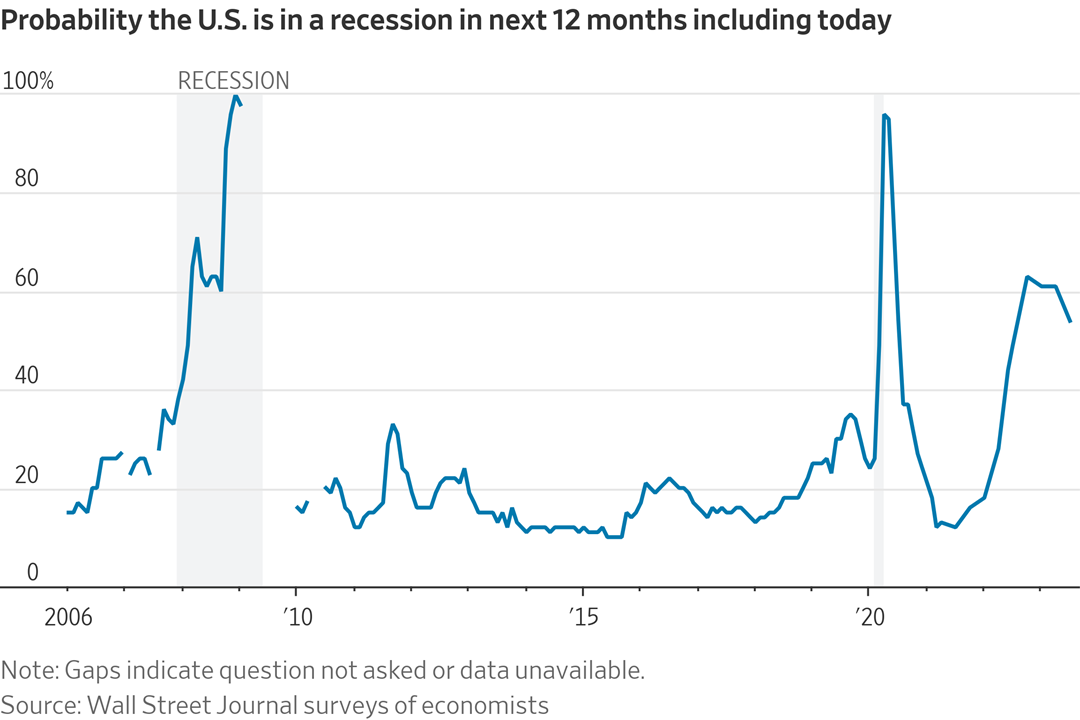
United Airlines reached a $10 billion accord with its pilots. The four-year agreement calls for pay raises for pilots of up to 40.2% over the duration of the contract, as well as improvements to work rules, job security and more. It’s the richest-ever labor pact at an American airline.
Market perspectives:
• Outside markets: The U.S. dollar index was weaker, with the euro firmer against the greenback. The yield on the 10-year U.S. Treasury note was lower, trading around 3.79%, with a lower tone in most global government bond yields. Crude oil futures were under pressure, with U.S. crude around $74.40 per barrel and Brent around $78.85 per barrel. Gold and silver futures were lower, with gold around $1,960 per troy ounce and silver around $25.01 per troy ounce.
• U.S. dollar is stumbling, hitting its lowest value in over a year. Indications of subsiding inflation have led many to believe that the Federal Reserve could truncate its plan of hiking interest rates, ushering in a possible turning point for the global reserve currency. This prospective shift could have significant implications for worldwide economies and financial markets. If this prediction pans out, developing countries would benefit from a long-term dip in the dollar's value as it would decrease their import expenses, thereby easing inflationary pressures. The Japanese yen, which has been in freefall for several months, could also strengthen due to this shift, causing a disruption in established trading strategies that are based on the premise of a weakened yen. In a broader context, a weakened U.S. dollar could lower the cost of goods sold by American companies globally, potentially propelling export expansion. However, this advantage could be detrimental for companies in Europe, Asia and elsewhere as their comparative export prices may increase.
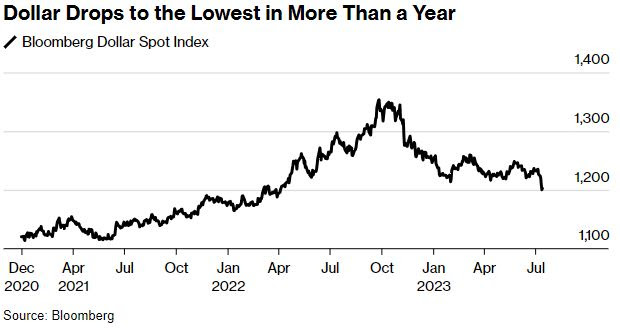
• Japan plans to propose a global gas reserve, similar to the emergency inventory in the oil sector, to help avoid future shortages and stabilize prices. Meanwhile, the European Union wants to make joint gas purchases a permanent feature of its post-Russia strategy.
• Head of the Teamsters' union, Sean O'Brien, urged President Biden not to interfere in their ongoing negotiation disputes with logistics giant UPS. This appeal comes after their talks broke down earlier this month. The current contract is set to expire on July 31, with one of the main points of contention being proposed salary hikes for part-time drivers.
• Ag trade: Bangladesh tendered to buy a nominal 50,000 MT of optional origin milling wheat.
• The current summer weather appears to be extreme with results that are not just severe but ergo fatal, as extreme heat, violent storms, and typhoons are threatening many parts of the globe. July has already set a record for the highest global temperatures ever, with heatwaves being experienced from California, Phoenix, to southern Europe, and other regions. The main reason for this intense heat is believed to be the return of El Niño weather patterns.
The severe weather is not limited to heat. In Hong Kong, a typhoon warning resulted in the stock exchange halting trading operations. In the northeastern United States, torrential rains led to flash flooding. These floods caused several issues such as the cancellation of flights, power outages, and submerged roadways. It also led to the declaration of a state of emergency in New Jersey.
The economic impact of these changes, particularly on small businesses, has prompted economists to express concerns. For instance, in Italy, a largely tourism-dependent country, concerns about the heat have led to advisories against outdoor activities during the warmer hours and avoided tourist destinations like Rome's Colosseum.
Of note: Besides physical and economic impacts, these weather patterns may also strain food and commodity prices. Deutsche Bank's strategist Henry Allen pointed out in an investors' note that El Niño events often result in more inflationary pressures due to higher commodity prices. As food prices soar, it could complicate the fight against inflation for central bankers.
• NWS weather outlook: Lengthy heat wave to continue in the Southwest, South Central U.S., and South Florida... ...Severe storms and bouts of heavy rain to occur from the Nation's Heartland to the Ohio Valley and Northeast through Tuesday... ...Canadian wildfire smoke responsible for Air Quality alerts over parts of the Northern High Plains, Midwest, Great Lakes, and Northeast.
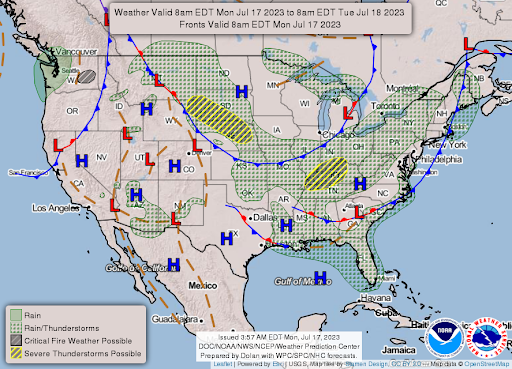
Items in Pro Farmer's First Thing Today include:
• Bulls in control of grains to start the week
• Rains favor central, southern growing areas
• Record June NOPA crush figure expected
• Indonesia sticking with domestic palm oil rules
• Bullish cash cattle expectations
• Cash hog fundamentals extend seasonal rally
|
RUSSIA/UKRAINE |
— Yellen: Ukraine support best way to help world economy. Treasury Secretary Janet Yellen stated on Sunday that intensifying support for Ukraine, currently embroiled in war, is the 'single best' method of assisting the global economy. Yellen, who made these remarks at a G20 finance ministers’ summit in India, emphasized that she would resist any criticism suggesting a trade-off between aid to Ukraine and developing nations. Yellen highlighted ongoing endeavors to alleviate debt distress faced by struggling economies, implement bank reforms, establish a global tax deal, and cautioned that discussions about lifting tariffs on China are "premature."
— Russia claimed Ukraine struck a bridge connecting Russia to Ukraine’s Crimean Peninsula, which Vladimir Putin’s forces illegally annexed nine years ago. Two people were killed in the "emergency incident" and inspections are underway to determine the extent of the damage, the Russian Ministry of Transport said. Ukraine's security service claimed responsibility for the attack, though Kyiv has not responded directly. Earlier this month, Ukraine made what appeared to be the clearest admission yet that its forces were behind an attack on the bridge last year that caused parts of it to collapse.
Video footage on social media revealed significant damage to the bridge’s structure. A Ukrainian source told AFP, a news agency, that Ukraine’s security services and navy had carried out the attack using waterborne drones. Traffic has been stopped on the bridge, which is the only direct link between Russia and the peninsula that the Kremlin annexed from Ukraine in 2014.
— Russia suspends key grain deal with Ukraine. The Russian government announced on Monday that it has suspended an agreement with Ukraine that ensures the safe passage of food grains through the Black Sea. Dmitry Peskov, the Kremlin spokesperson, stated that the deal will be resumed once Russia's terms related to the Black Sea grain pact are met. Russia asserts that Western sanctions have severely constrained its ability to export grain and fertilizer, posing a significant threat to global food security. Although there are no explicit sanctions on Russian grain and fertilizer exports, Russia argues that aspects like transport, shipping, finance, and insurance are heavily affected by sanctions.
This suspension has had global ramifications, causing a surge of more than 3% in U.S. benchmark Chicago wheat futures to $6.40 per bushel early on Monday. Analysts note this move threatens global food security and is likely to increase food prices worldwide.
— Russian grain exports will continue. Russian grain exporting union Rusgrain said on Monday its members planned to continue supplying customers with Russian grain at competitive prices, despite Moscow pulling out of the Black Sea grain export deal. “Russia is the largest supplier of wheat to the world market... All contractual obligations of Russian grain exporters will be fulfilled,” it said.
Turkish President Tayyip Erdogan said on Monday that he believes Russian President Vladimir Putin wants the continuation of the grain export deal, despite the suspension. Erdogan said he would discuss the deal, including the export of Russian grains and fertilizer, with Putin when they meet in person during an expected meeting next month.
|
POLICY UPDATE |
— WOTUS update. The Environmental Protection Agency (EPA), under President Biden's administration, has requested court intervention in the Waters of the U.S. (WOTUS) issue as it prepares a new rule to replace its previous version. This follows a disruption caused by a U.S. Supreme Court decision earlier this summer. EPA aims to present its new final rule for WOTUS before Sept. 1, but the rule has not yet been submitted to the Office of Management and Budget (OMB) for review. OMB can take up to three months to review agency plans. Once the new rule is presented, it will be closely scrutinized, and the possibility of additional legal disputes cannot be excluded.
|
PERSONNEL |
— Director of CFTC’s whistleblower program steps down. Christopher Ehrman, who has led the Commodity Futures Trading Commission’s (CFTC) whistleblower program since 2013, has announced his departure from the role. Ehrman will immediately transition to working as a lawyer in the private sector, where he will represent whistleblowers.
Meanwhile, Christina McGlosson, who recently resumed her position as associate director of the whistleblower office after a two-year stint in the private sector, has been appointed as the acting director of the program by the derivatives-market regulator.
|
CHINA UPDATE |
— China's economic growth is slowing, with an increase of only 0.8% in the second quarter compared to the first, according to data from China's National Bureau of Statistics. This is less than half of the 2.2% growth rate recorded in the first three months of the year. Factors contributing to this slowdown include weak retail sales, muted private-sector investment, and a decrease in exports. Additionally, youth unemployment reached a record high in June. These indicators suggest a weakening pace of recovery which has the potential to slow the global economy in 2023.
Market impacts: The disappointing data hit commodities and stocks this morning, with Brent crude tumbling to a one-week low and shares in the China-dependent luxury groups LVMH and Richemont opening sharply lower. Shortly after, Morgan Stanley and Citigroup cut their full-year growth forecasts for China.
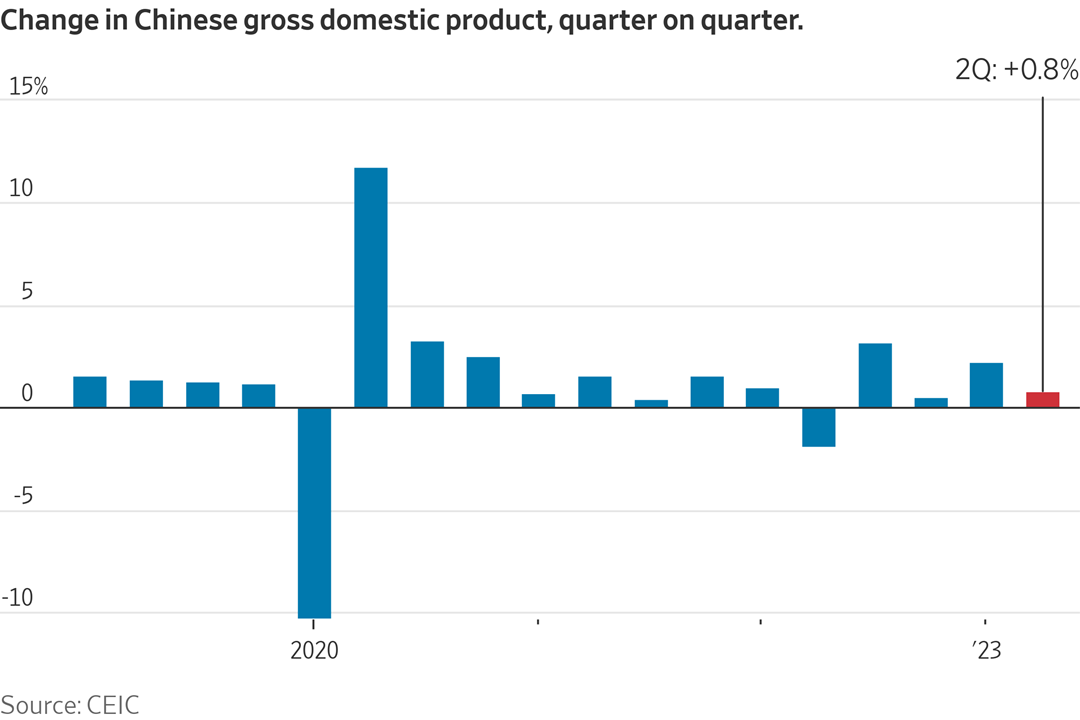
— China keeps rates unchanged. The People’s Bank of China (PBOC) maintained the one-year medium-term lending facility (MLF) rate at 2.65% after a 10 basis points cut in June. However, the central bank injected a total of 103 billion yuan ($14.37 billion) in MLF loans to provide liquidity support to the banking system. Despite no cut to interest rates this month, market participants expect China will need to implement additional stimulus measures to bolster the slowing economy.
— China’s wheat output falls 0.9%. China’s wheat production fell 0.9% from last year to 134.53 MMT, according to official data. Wheat acreage increased 0.4% but yields fell 1.3%, as heavy rains hit key growing regions ahead of harvest. The late-season rains also hurt crop quality.
— China’s Q2 pork output surges. China’s second-quarter pork output rose 4.6% from last year to 14.4 MMT, the highest in at least a decade for the period. Amid poor margins and concerns of weaker prices ahead, farmers culled hog herds, increasing pork production. China’s pork output in the first half of the year rose 3.2% from the same period last year to 30.3 MMT. China slaughtered 375.48 million hogs in the first six months of the year, up 2.6% from a year ago. China’s pig herd rose to 435.17 million head in the second quarter, up 4.23 million head from the end of the first quarter.
|
TRADE POLICY |
— U.S. Trade Representative Katherine Tai will be focusing on trade issues with Kenya this week during her three-day visit, which includes a meeting with the country's president, William Ruto. This is in line with the Biden administration's preference of using trade and investment framework agreements over free trade agreement (FTA) talks, a trend that was initiated under the Trump administration. After Kenya, Tai is scheduled to proceed to Brussels for a meeting with her European Union (EU) counterpart, Valdis Dombrovskis.
|
ENERGY & CLIMATE CHANGE |
— On Friday, the Environmental Protection Agency (EPA) denied 26 small refinery exemptions (SREs) which were sought by refiners to mitigate their responsibilities under the Renewable Fuel Standard (RFS). These applications were related to quota alleviation for the compliance years of 2016-2018 and 2021-2023. In a departure from previous rules, the EPA has commenced disclosing the names of refiners that have submitted SREs requests from July 1, 2022, onward.
— Equitrans Midstream, the builder of the Mountain Valley Pipeline, has requested that the U.S. Supreme Court step in to allow construction to resume after another halt by a federal appeals court last week. The contentious project is currently under Chief Justice John Roberts' scope, as he handles emergency matters arising from the Fourth Circuit Court of Appeals. Roberts has the option to either handle the issue independently or ask the full court for consideration. The pipeline company warned that, unless the highest court in the nation intervenes, they may fail to complete construction by year's end as planned.
— The transition to heavy-duty electric trucks is progressing faster than the requisite power grid upgrades required to support them, according to the Wall Street Journal (link) This discrepancy in growth has resulted in fleets resorting to diesel generators for recharging the trucks, thereby negating their environmental benefits. California utility company PG&E has noted that truckers won't be able to charge these electric vehicles during peak summer demand for a few years due to ongoing grid capacity issues. Estimates from a 2021 state report suggest that 180,000 zero-emission commercial vehicles will be operational by 2030, necessitating 157,000 chargers. However, according to the trucking industry, fewer than 700 chargers are currently available at terminals. Southern California Edison has warned that the anticipated power demand may be so significant that it could require new substations, an infrastructure development that could take several years.
— U.S. Climate Envoy John Kerry recommenced crucial climate talks with Chinese officials, their first in nearly a year. Both nations, being the world's top two contributors to pollution, have mutually committed to strive for tangible outcomes despite ongoing deep-rooted tensions. Key points of focus include determining climate goals, addressing methane emissions, and tackling reliance on coal-fired power generation.
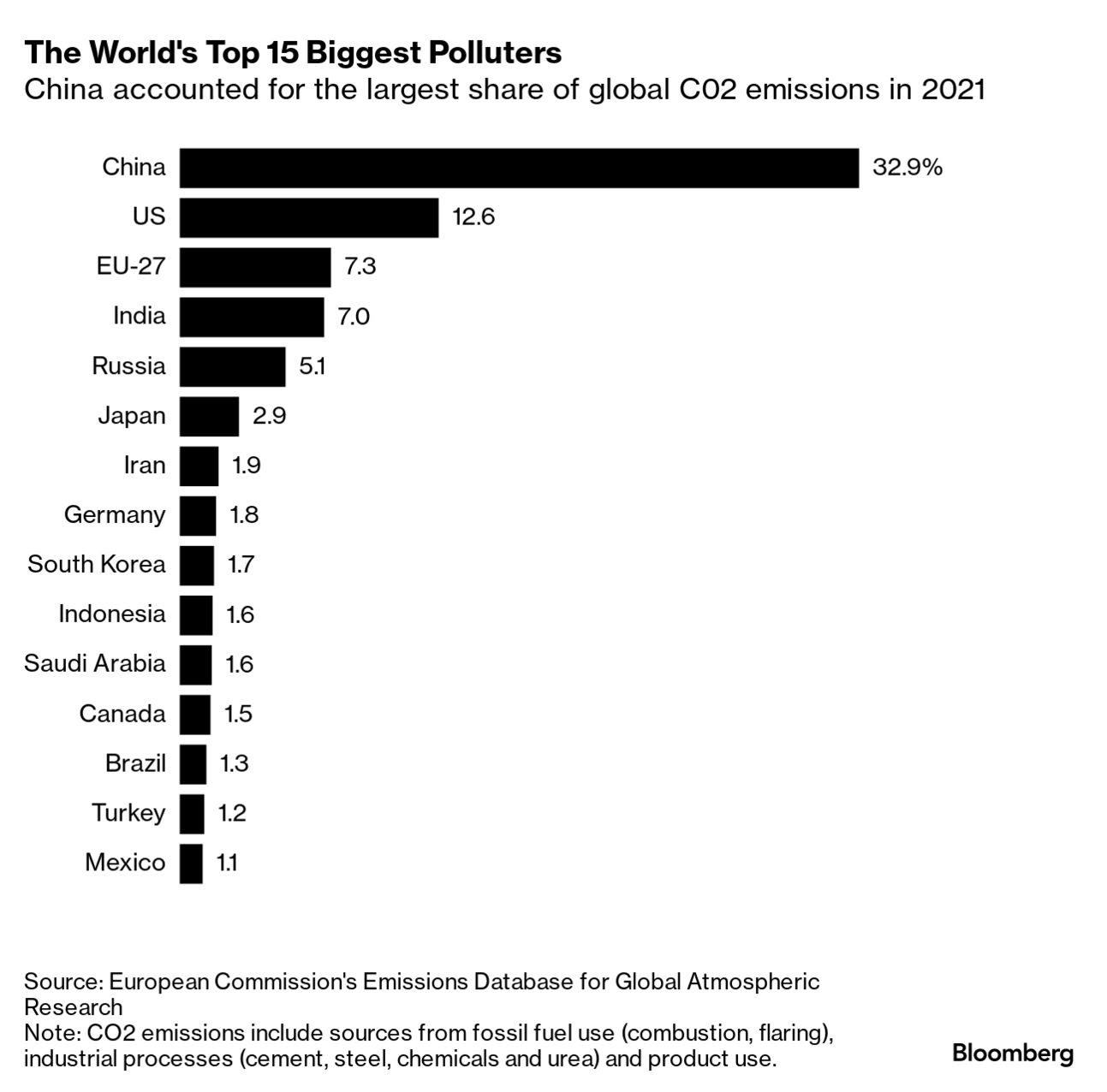
|
LIVESTOCK, FOOD & BEVERAGE INDUSTRY |
— In Massachusetts, the enforcement of a state law (Question 3) necessitating suitable living conditions for livestock has been delayed until Aug. 23 due to an ongoing lawsuit. The law instructs farmers to grant enough space for veal calves, breeding sows, and egg-laying hens to maneuver and extend their limbs. This announcement came as parties involved, including state officials, the restaurant and pork industries, require more time to assess outstanding issues following the Supreme Court's upholding of a similar California law, Proposition 12, in May.
The extension was approved by U.S. district judge Margaret Guzman to allow for further consultations and possible settlement negotiations. The Massachusetts suit, like the one taken to the Supreme Court, challenged the constitutionality of the animal welfare standards established by a 2016 referendum, known as Question 3.
Following the Supreme Court's decision, the National Pork Producers Council stated that Massachusetts could define its own meat production standards. However, issues such as restrictions on shipping noncompliant pork products through Massachusetts to other New England states or other countries remain unsettled.
Question 3 not only establishes standards for Massachusetts farmers but also prohibits the sale of goods from other states unless they abide by Massachusetts' regulations. According to the NPPC, this creates additional obstacles in the pork supply chain by preventing the transportation of noncompliant pork through Massachusetts for delivery to other locations.
NPPC’s take: “This extended implementation allows the coalition and Massachusetts to continue discussions on implementation to ensure a smooth transition — including the transshipment and exports of pork through Massachusetts — so pork can continue to reach other New England states as well as provide guidance to the industry and supply chain. It is important to note that this Status Report and Joint Motion to Extend Stay does not change Q3, the rules, or what it means to be compliant. It simply extends the existing enforcement stay for a few more weeks.”
|
POLITICS & ELECTIONS |
— The ongoing race for the Republican presidential nomination is revealing significant fundraising disparities amongst the candidates, according to recent campaign finance reports. Florida Governor Ron DeSantis is a prominent fundraiser, having amassed $20 million. However, his campaign expenditures are also exceptionally high and rapidly depleting these funds. Despite being indicted twice this year, former President Donald Trump remains the polling leader for the Republican nomination and raised $17.7 million within this quarter. In contrast, former Vice President Mike Pence's fundraising showed a much more modest haul, coming in at less than $1.2 million.
On the Democratic side, President Joe Biden's campaign operations seem to be proceeding with minimal resources. His campaign reportedly spent just $1.1 million in the second quarter and employed only four staffers by the end of June. For comparison, former President Barack Obama had expended in excess of $11 million during the same period in his reelection campaign back in 2011. This suggests Biden is running a notably lean operation relative to previous presidential campaigns.
But… the Biden campaign has reported raising over $72 million in the second quarter, greatly exceeding the funds raised by Donald Trump and other Republican candidates. However, there is speculation whether Biden's fundraising success is due to the lack of a clear winning alternative to Trump in the field. Major contributors to Biden's funds include ten donors who contributed $500,000 or more to the Biden Victory Fund. These donors include Hollywood tycoon Jeffrey Katzenberg, who is also co-chairing Biden's re-election campaign; Reid Hoffman, co-founder of LinkedIn; and hotel magnate Stewart Bainum. Other significant contributors include John Wolthuis, co-founder of Twilio, who donated $300,000, and Sam Altman, chief of OpenAI, with a $200,000 donation.
Despite this robust support from large donors, the campaign has reason for concern. The smaller donors, crucial for a campaign's success as they can continue donating after larger contributors hit their limits, have been slow in their contributions.
Of note: Sen. Joe Manchin, a West Virginia Democrat at odds with Biden over climate policy, is attending a town hall in New Hampshire today, hosted by No Labels, a group considering a third-party presidential nominee.
|
KEY LINKS |
WASDE | Crop Production | USDA weekly reports | Crop Progress | Food prices | Farm income | Export Sales weekly | ERP dashboard | California phase-out of gas-powered vehicles | RFS | IRA: Biofuels | IRA: Ag | Student loan forgiveness | Russia/Ukraine war, lessons learned | Russia/Ukraine war timeline | Election predictions: Split-ticket | Congress to-do list | SCOTUS on WOTUS | SCOTUS on Prop 12 pork | New farm bill primer | China outlook | Omnibus spending package | Gov’t payments to farmers by program | Farmer working capital | USDA ag outlook forum | Debt-limit/budget package |


